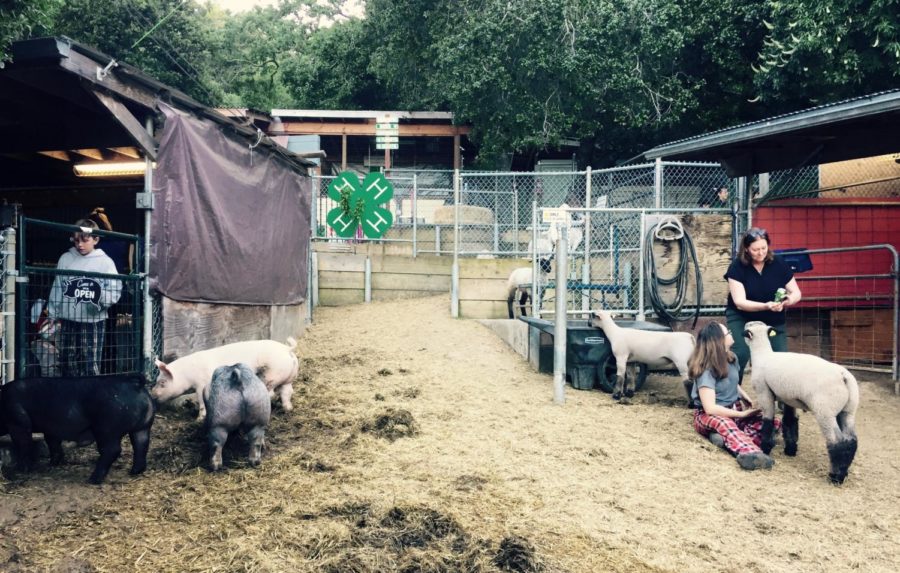When people think about county fairs, they usually associate them with hot summer days, carnival rides and games, cotton candy, and livestock exhibitions. What most fair-goers don’t realize is that for some young people, the county fair is more than just a day of summer fun. In fact, for members of local 4-H and Future Farmers of America (FFA) groups, the county fair is a weeklong culmination of months of planning and hard work.
4-H is a youth development organization that provides opportunities for young people to participate in projects and events that emphasize hands-on learning. Similarly, FFA is an extracurricular youth group for kids that are attracted to farming and leadership. At the San Carlos/Eaton Hills 4-H farm, around 20 kids ages 9 to 17 commit to raising hogs, lambs, goats, turkeys, and chickens from February to June.
Erica Thuener, the San Carlos/Eaton Hills 4-H farm manager, said, “4-H’s philosophy is to provide experiences where youth learn by doing. The spark that ignited my daughter, and now my son, to learn by doing was raising livestock animals to show and sell at the San Mateo County Fair.”
For 4-H and FFA members, the San Mateo County Fair is a week-long experience of caring for animals and hanging out with friends. Members must show up every day of the fair at 7 a.m. to clean, feed, exercise, water, and perform chores around the barn. They return at 5 p.m. to feed and water their animals.
Tia Chan, who has raised large animals for three years, said, “Fair is a fun and stressful time of the year … I feed my animal twice a day, with the specific times given by the fair, clean my pen, exercise my lamb, [and] educate the public on livestock and our goal with 4-H.”
Additionally, the youth are required to participate in activities like barn duty and Peninsula Pride. Barn duty consists of monitoring the barn area and making sure that the animals are comfortable and have adequate water. The participants are also available to answer any questions the public may have about the animals. Peninsula Pride, also known as Pen Pride, is a fundraiser that is held to support local 4-H clubs and help promote the organization. Participants have to guess the combined weight of two animals, and the closest estimations win prizes donated by local businesses.
However, the two cornerstones of county fair experience are the livestock show and the live auction. The two events arguably require the most preparation out of all the events in the fair. The show portion consists of two major parts: market and showmanship. In the market class, the judge analyzes the animal and looks at the quality of the animal, while in the showmanship class, the judge watches how the kid handles their animal in the ring. At the live auction, the youth present their livestock to a group of potential buyers who may place a bid on one or more animals. For most kids, the profits will be reinvested into another animal the following year.
People who bid on the animals at the fair are motivated to buy meat that was cared for by these youth organizations because the animals are treated more humanely. While the price on the animals is significantly higher than supermarket prices, the bidder often has the confidence that they are receiving a high-quality product. Additionally, when buyers purchase the animal from 4-H or FFA, they have the right to request information on everything given to the animal including any injections, types of feed, and even treats.
People are sometimes critical about raising animals for consumption.
Peyton Steitz, who has raised lambs for three years, said, “I think [people] should know that most of us don’t do it to make money, and we’re not horrible people for processing animals, but it’s because we care for each other and the animals so they have the best life they could have.”
Kids who do participate in the farm experience also have a deeper understanding of where their food comes from and the effort that it takes to raise an animal for consumption.
“These youth who raise market animals from farm to fair have a deep connection to the foods they eat. They have firsthand knowledge of how much care goes into raising safe, quality meats for consumers. Living in our suburban community does not lend itself to many opportunities for today’s youth to feel this connection,” Thuener said.
There are many benefits to raising an animal through 4-H and FFA. Members experience lots of hands-on learning while working at the farm. If there is a problem with the facilities or their animal, they must come up with a solution.
Another positive aspect of the “farm to fair” experience is that it encourages young people to take the initiative and build responsibility.
Emma Loiza, who raised large animals for five years and is now a freshman at California Polytechnic State University, said, “[4-H] taught me a lot about responsibility, time management, and teamwork, which are all important skills to have in college.”
The skills gained from working on the farm are especially advantageous if the youth decides to pursue a career in agriculture or animal sciences.
“My major at Cal Poly is animal science, so being in 4-H has helped prepare me for college. Everything I learn in lectures is easier for me to understand and visualize because of my knowledge of the nutritive needs, physiology, and well-being of livestock animals,” Loiza said.
Furthermore, the experience of being at the farm every day helps nourish deep and long-lasting friendships. For many of the 4-H members, the fair week is one of the most fun weeks of the year because they get to spend time with close friends from their club.
14-year-old Hayley Huston, who has raised animals such as hogs and lambs, said, “Fair is like a vacation. You get about a week just hanging out with your friends and running around going on rides. But fair is truly my favorite part of the year because you make friendships that will last a lifetime.”
Even the process of selling an animal at the fair is a learning opportunity, as it encourages the youth to create a business model, which includes attracting potential buyers and managing expenses.
Despite all of the upsides of the “farm to fair” experience with 4-H or FFA, there are a couple of downsides that one must take into account before deciding to raise an animal. The entire process is a huge responsibility and requires significant investments of time and money. Because of this, many students are forced to choose between spring sports or being on the farm.
In the Bay Area, kids and teens have a wide variety of extracurricular activities to choose from, including sports, school clubs, and more. Organizations such as 4-H and FFA offer an alternative to the more popular Bay Area programs by providing an opportunity for hands-on learning while also developing life skills and strong friendships.
“Every day, you are on the farm with the same people, and any time a problem comes up, you have to work together to solve it. Going into a pen every day and working with your animal every day definitely teaches you hard work in a way school or sports never could,” Huston said.
The 2019 San Mateo County Fair will run from June 8 to June 16 at the San Mateo County Events Center.



